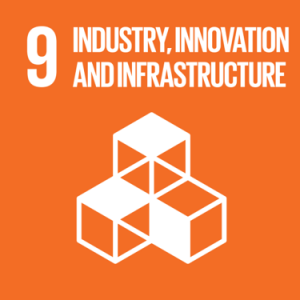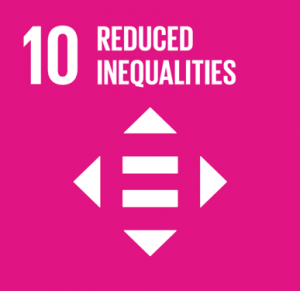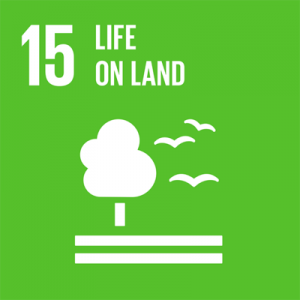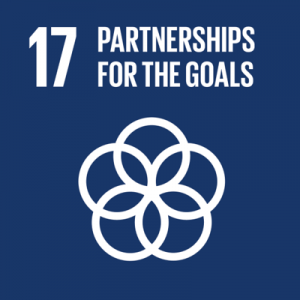SUSTAINABLE DEVELOPMENT GOALS
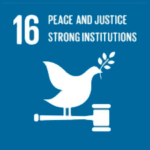
SDG 16: PEACE, JUSTICE, AND STRONG INSTITUTIONS
“SDG 16 and 17 explore some of the underlying factors that are needed in order to ensure delivery of the other SDGs. Peace and Justice go hand in hand – and indeed are vital for equity between people and countries. Supporting this we need our institutions to be strong enough to maintain a focus on delivering the SDGs. This can range from individual justice – eradicating modern slavery and people trafficking – to ensuring that our countries have the evidence base needed to react appropriately to crises.”
(THE Impact Rankings)
University governance measures
IPB University has elected representatives in the university’s highest governance body, the Board of Trustees (MWA). Based on IPB University’s MWA Decree No. 09/WMA-IPB/P/2021 concerning Organizational Structure and Governance, the MWA consists of 17 members representing various stakeholders, including the Ministry of Education, the Rector, the Academic Senate representing eight lecturers, the head of the educational energy organization, the president of the student organization, the head of the alumni association, and four community representatives. Through this composition, IPB University ensures the presence of elected representatives from students, lecturers, and educational staff in the university’s highest decision-making body.
The Forum of Educational Staff (Forum Tenaga Kependidikan – Fortendik) of IPB University envisions itself as a partner of IPB University in supporting the development of human resources. Fortendik is expected to serve as a key partner in the university’s transformation and to actively take part in carrying out the transformation process.
IPB expert, as the general chairman of the Indonesian Fishermen and Farmers Movement (GANTI), was established as an organization that places great emphasis on fighting for the rights and welfare of fishermen and farmers. GANTI’s presence is expected to become a platform for advocacy, education, and empowerment, focusing on the fisheries and agriculture sectors in an integrated manner.
GANTI’s vision and mission encompass three main pillars:
- Empowerment: through training and mentoring for farmers and fishermen.
- Education: providing information and knowledge related to sustainable agricultural/marine technology and practices.
- Collaboration: establishing partnerships with the government, academia, and the private sector to provide better access to resources for fishermen and farmers.
Through all these efforts, GANTI hopes to create positive and sustainable change for fishermen and farmers throughout Indonesia—from the local to the national scale—so that this sector can compete in the era of free trade and regional developments such as the ASEAN Economic Community (AEC).
IPB University has established comprehensive written policies and procedures to identify and engage with local stakeholders external to the university. The overall coordination of activities and the implementation of specific guidelines for stakeholder engagement are managed by the Directorate of Community Development. This directorate is responsible for formulating strategies, programs, and collaborations that strengthen the university’s relationship with surrounding communities and relevant external partners. The IPB University Statute, Articles 38–39 (page 27-28), provides the legal and institutional foundation for such collaboration, stipulating the principles and mechanisms governing both academic and non-academic partnerships. Furthermore, the Majelis Wali Amanat (MWA) Regulation No. 11/IT3.MWA/PR/2018 concerning Non-Academic Collaboration further elaborates the framework for engagement by defining the scope of non-academic cooperation, establishing the criteria for evaluating prospective partners, and detailing the procedures for implementation (page 4-9). Through these regulatory instruments, IPB University ensures that the process of identifying and engaging local stakeholders is conducted systematically, transparently, and in alignment with the university’s mission to promote community empowerment and sustainable development.

IPB University ensures that local stakeholders, including local residents, local government, and civil society representatives, have meaningful mechanisms for participation in university decision-making processes. This commitment is reflected in the structure of the university’s Board of Trustees (Majelis Wali Amanat – MWA), which includes representatives from various stakeholder groups such as faculty, students, and the community. Specifically, four representatives from society serve as members of the Board of Trustees: Mochamad Ridwan Kamil (Governor of West Java Province), Suryopratomo, Sunarso, and Agus Joko Pramono, all of whom actively participate in strategic decision-making at the institutional level. The Directorate of Community Development oversees the policies and guidelines that facilitate stakeholder engagement, ensuring systematic coordination between the university and its surrounding communities. Beyond governance representation, IPB University also maintains active collaboration with local governments and community organizations.
For instance, since 2021, IPB University and the Local Government of Bogor have launched the Sekolah Pemerintahan Desa program to strengthen local governance and enhance the capacity of village officials. Similarly, through the ARM HA-IPB organization under the Merdeka Belajar–Kampus Merdeka (MBKM) framework, IPB fosters student engagement in humanitarian fields, promoting collaboration in areas such as disaster management, community empowerment, and cross-sector partnerships. IPB University also engages in local innovation and economic empowerment initiatives, as exemplified by the collaboration with community and business actors in Lamongan Regency, where innovative approaches transformed catfish into a strategic national commodity, improving local economic welfare.
In addition, research collaborations, such as the TEEB AgriFood Indonesia Program in Kayong Utara Regency, West Kalimantan, highlight the university’s role in providing policy recommendations that balance agricultural productivity, farmer welfare, and environmental sustainability. Furthermore, IPB University’s internal coordination meetings on institutional asset management demonstrate its inclusive approach to strengthening independence and competitiveness as a State-Owned Legal Entity (PTN-BH), involving both internal and external stakeholders in governance processes. Finally, IPB University’s partnership with the Murung Raya Regency Government in developing a master plan for a Horticultural Seed Center (BBH) underscores the university’s contribution to regional policy formulation and sustainable development. Collectively, these initiatives demonstrate IPB University’s strong and institutionalized commitment to inclusive, participatory, and community-oriented decision-making in pursuit of sustainable societal impact.

IPB University has established clear principles and commitments to preventing organized crime, corruption, and bribery, which are explicitly stated in the Senate Academic Regulation No. 33/SA-IPB/P/2019, Article 1 point (m), page 3, and Article 11, pages 9–10, under the section “Pencegahan Kejahatan Luar Biasa” (Prevention of Extraordinary Crimes). These regulations form the foundation of the university’s governance ethics and reflect IPB University’s strong stance against corruption and unethical practices. In line with this commitment, IPB University actively collaborates with the Corruption Eradication Commission (Komisi Pemberantasan Korupsi – KPK) in promoting integrity and transparency across institutional activities. Moreover, IPB University experts play a proactive role in public discourse and policymaking related to anti-corruption and law enforcement. For example, Professor Bambang Hero Saharjo, an IPB University academic, publicly critiqued the calculation methods used by the Attorney General’s Office in a high-profile tin corruption case, emphasizing the need for evidence-based and scientifically grounded approaches to determine state losses. This illustrates the crucial role of academia in ensuring accountability and scientific rigor in anti-corruption efforts.
In addition, IPB University supports national and international policies that protect individuals and groups advocating for justice and environmental integrity. The university strongly welcomed the enactment of Ministerial Regulation No. 10 of 2024 by the Ministry of Environment and Forestry (KLHK), which provides legal protection for environmental defenders. IPB University has consistently defended the rights of environmental activists and scholars facing criminalization, as demonstrated in the case of Professor Bambang Hero Saharjo, who faced a lawsuit after serving as an expert witness in a forest fire case involving PT Jatim Jaya Perkasa. The university condemned such actions as forms of intimidation against scientific integrity and environmental protection efforts. Through these policies, collaborations, and advocacy efforts, IPB University reinforces its institutional commitment to ethical governance, academic integrity, and the fight against organized crime, corruption, and bribery in all aspects of academic and societal engagement.
IPB University upholds and guarantees academic freedom as a fundamental principle of higher education. This commitment is formally established in the Academic Senate Regulation No. 28/SA-IPB/P/2018 concerning Norms, Academic Freedom, and Scientific Autonomy. Article 4 point (2) page 8 of the regulation defines the scope of academic freedom, which encompasses activities related to teaching, research, and community empowerment. The policy applies to all members of the academic community, including faculty members, staff, and students, ensuring that every individual has the right to explore, express, and disseminate knowledge without undue restriction. Furthermore, Article 4 point (3) specifies the forums and contexts in which academic freedom must be respected and protected, affirming the university’s commitment to fostering an open, critical, and innovative academic environment. Through this regulation, IPB University reinforces its dedication to scientific autonomy, intellectual integrity, and the pursuit of knowledge for societal advancement.
IPB University regularly publishes its annual financial report as part of its commitment to transparency and accountability. The publication of this report is in accordance with the Central Information Commission Regulation No. 1/2010 on Public Information Service Standards, which mandates public access to financial information. The report provides a comprehensive overview of the IPB University’s financial performance, including income, expenditures, and budget allocation. Furthermore, the annual financial statements are audited by PricewaterhouseCoopers (PwC), an independent and reputable auditor, to ensure accuracy, reliability, and compliance with financial reporting standards.
IPB University is committed to transparency in financial management through the publication of its annual financial reports. The university’s financial reports, including the 2024 audited financial statement (page 3-43), are prepared in accordance with applicable standards and have been independently audited by PricewaterhouseCoopers (PwC). This practice aligns with Central Information Commission Regulation No. 1/2010 concerning Public Information Service Standards (page 46-49), which mandates that such information be accessible to the public at all times. By making its audited financial reports publicly available, IPB University ensures accountability, transparency, and confidence in its financial governance and resource management.
Working with government
IPB University actively provides expert advice and evidence-based recommendations to local, regional, and national governments through multiple channels, including policy guidance, participation in strategic forums, and collaboration with public institutions. For instance, in response to rising staple food prices in Indonesia, IPB experts have recommended food diversification strategies to mitigate the risk of shortages and enhance food and nutritional security, particularly for low-income communities. Through the Agromaritime Outlook 2024, IPB’s HA IPB program develops strategic policy recommendations for integrated agricultural and maritime sector development, fostering collaboration between academics, industry players, and government agencies to strengthen food security, export competitiveness, and sustainable economic growth. The Ministry of Trade recognizes such initiatives as vital for promoting cross-sector collaboration and supporting the agromaritime sector as a pillar of national development.


Additionally, IPB University has demonstrated its commitment to stunting reduction and national nutrition policies through its 43rd Strategic Talks, organized by the Directorate of Strategic Studies and Academic Reputation (DKSRA), which brings together government, academic, and community stakeholders to formulate evidence-based strategies. In support of rice self-sufficiency, IPB University has developed adaptive agricultural innovations, such as cultivating upland rice on smallholder oil palm replanting (PSR) land, optimizing land use, increasing farmer productivity, and generating income. Across these initiatives, IPB University systematically combines research, policy guidance, and multi-stakeholder collaboration, positioning itself as a strategic partner for government in the formulation, implementation, and evaluation of regional and national economic and food security policies.
IPB University actively contributes to outreach, general education, upskilling, and capacity-building for policymakers and government officials on key national and global issues, including economics, law, technology, climate change, and sustainable resource management. A concrete example is the Rector Discussion Forum, led by the IPB Rector Prof. Arif Satria, which brought together university rectors, the Minister of Higher Education, Science, and Technology, Prof. Satryo Soemantri Brodjonegoro, and the Minister of Agriculture, Andi Amran Sulaiman. This forum reflects the commitment of IPB University to strengthen synergies between the education and agricultural sectors to support national development goals, particularly food security and sovereignty. In addition, IPB University plays an active role in promoting the Blue and Green Economy concepts, providing policymakers with knowledge and practical strategies for sustainable natural resource management through seminars and workshops. These initiatives create opportunities for knowledge exchange and collaborative research, as well as the development of proposals aimed at improving resource management, fostering industry-government-university collaboration, and supporting national food security. By facilitating dialogue and capacity-building among government officials, lenders, industry actors, and the community, IPB University ensures that science and technology contribute effectively to inclusive economic growth and long-term sustainable development, in line with Indonesia’s vision for Golden Indonesia 2045.
Institut Pertanian Bogor (IPB University) consistently demonstrates its role as a higher education institution that not only emphasizes academic education and research but also actively establishes strategic collaborations with various regional governments to conduct policy-oriented research and regional development.
Based on several cooperation agreements and Memoranda of Understanding (MoUs) signed with local governments, IPB University is committed to supporting governmental bodies in formulating, analyzing, and implementing policies that directly impact regional development and improve community welfare.
For example, as reported by Victory News, the Rote Ndao Regency Government signed four cooperation agreements with IPB University covering livestock, fisheries, and crop agriculture sectors. This collaboration not only focuses on educational development but also includes research that can serve as the basis for policy-making in these sectors to enhance productivity and regional competitiveness.
Furthermore, the collaboration with Sukamara Regency Government, as reported by Halo Dayak, emphasizes synergy in realizing the university’s tridharma of higher education—education, research, and community service—particularly in applied research supporting public policy at the regional level, especially in human resource development and food security.
The news from Universitas Islam Negeri Raden Intan Lampung (UIN RIL) and IPB University highlights that the partnership is also directed toward strategic research, particularly on environmental issues and the development of sustainability-based study programs. This aligns well with supporting government policies in environmental management and sustainable development.
IPB’s cooperation with Sukamara and Halmahera Selatan Regencies, PT Sentul City, and Universitas Labuhanbatu, as covered by Milenianews, further reinforces IPB’s role in conducting research supporting regional development programs such as food security, agro-maritime sectors, and business innovations aligned with strategic regional policies. Lastly, the article from Deteksi.co about the MoU between the Regent of West Nias and IPB University underscores research focused on developing plantation masterplans and feasibility studies for fisheries ports. This collaboration highlights IPB’s crucial role in providing policy-oriented research to support the region’s vision for sustainable economic development.
In summary, these examples of collaboration clearly demonstrate that IPB University, as an institutional body, actively conducts policy-focused research through partnerships with various government departments and regional governments. The outcomes of this research serve as a strategic and practical foundation for decision-making aimed at advancing regional and national progress.


IPB Strategic Talks serves as a neutral platform and safe space where political stakeholders, policymakers, academics, and community representatives can openly discuss pressing national challenges. The forum provides opportunities for evidence-based dialogue on strategic issues related to agriculture, marine affairs, biosciences, food security, and sustainable development. Organized regularly by the Directorate of Scientific Studies and Academic Reputation, IPB Strategic Talks encourages cross-sector collaboration and constructive exchange of ideas to support policy formulation and national development goals.
In addition to IPB Strategic Talks, IPB University also facilitates other neutral discussion platforms such as IPB Policy Forum, Public Lecture Series, and Focus Group Discussions (FGD) involving government officials, legislators, industry representatives, and civil society organizations. These activities aim to strengthen IPB University’s role as a knowledge-based institution that bridges science and policy, providing a safe, inclusive, and intellectually open environment for dialogue among diverse political and social actors.
IPB University provides a neutral platform and safe space for political stakeholders to engage in frank and constructive discussions on national and regional challenges through the IPB Strategic Talks. These forums bring together a diverse range of participants, including academics, government officials, and political stakeholders, to deliberate on policies and issues related to agriculture, marine sciences, and biosciences. Organized regularly by the Directorate of Scientific Studies and Academic Reputation, IPB Strategic Talks ensure an impartial environment where differing perspectives can be shared openly, fostering collaborative problem-solving and informed decision-making in addressing complex societal and policy challenges.
SDG 16 IN NUMBER
7,813
Number of graduates in most recent year
267
Number of graduates from Law
3.4 %
Percentage of graduates from Law
RELATED NEWS
It seems we can't find what you're looking for.









